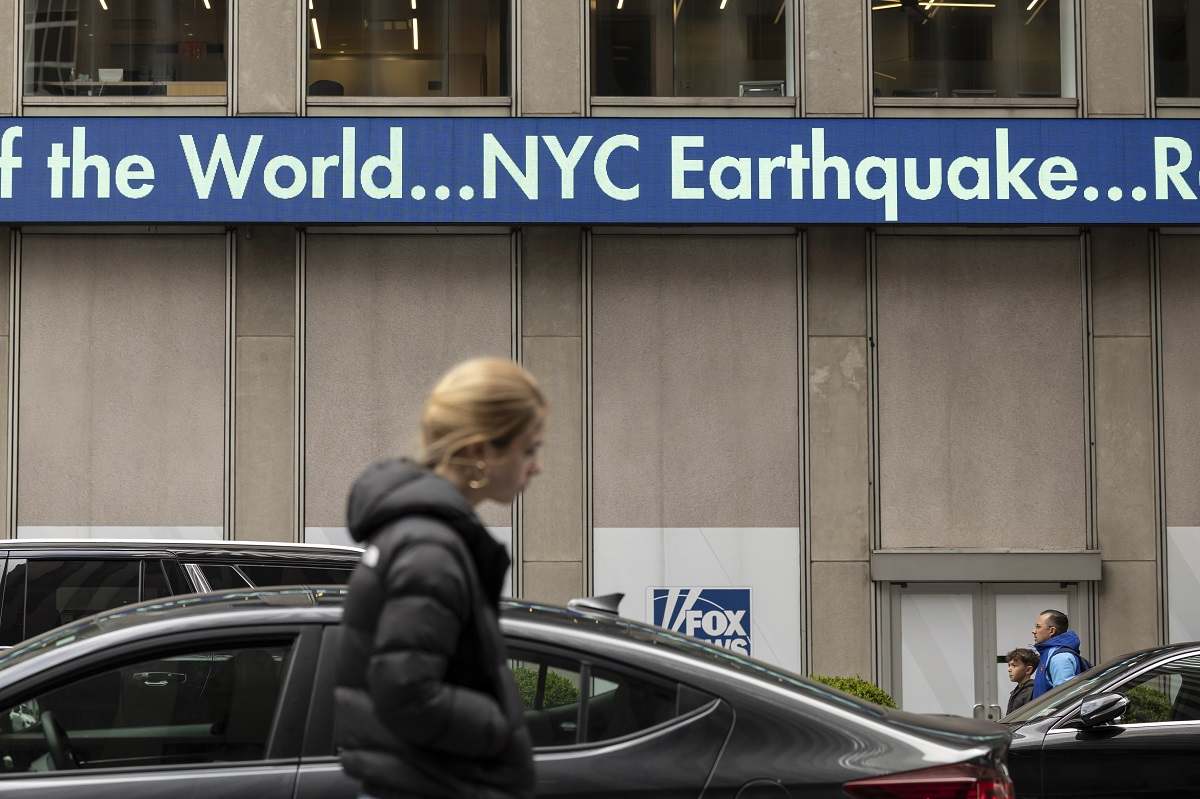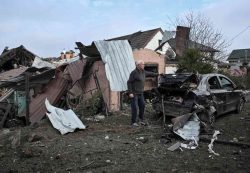East Coast Earthquakes Aren’t Common, but They Are Felt by Millions. Here’s What to Know

A display shows the news about an earthquake in New York City at News Corp Headquarters, Friday, April 5, 2024, in New York.
12:19 JST, April 7, 2024
DALLAS (AP) — East Coast residents were jolted Friday by a 4.8-magnitude earthquake centered near Lebanon, New Jersey, with weak rumblings felt as far away as Baltimore and the Massachusetts-New Hampshire border. No life-threatening injuries or major damage have been reported.
Here’s what to know about earthquakes on the East Coast.
How are earthquakes measured?
The Richter scale, developed by Charles F. Richter in the 1930s, is no longer widely used. According to the U.S. Geological Survey, as more seismograph stations were installed worldwide to calculate the size of an earthquake, Richter’s method was valid only for certain distance and frequency ranges.
Seismometers are instruments used to record the ground’s motion. Magnitudes are measures of an earthquake’s size. They range from 2.5 or less, which are usually not felt, to 8.0 or higher, which can cause great damage.
How often do New York City and the East Coast get earthquakes?
Earthquakes large enough to be felt by a lot of people are relatively uncommon on the East Coast. Since 1950 there have been about 20 quakes with a magnitude above 4.5, according to the United States Geological Survey. That’s compared with over 1,000 on the West Coast.
That said, East Coast quakes like the one experienced Friday do happen.
“There’s a history of similar-sized earthquakes in the New York region over the last few hundred years,” said Jessica Thompson Jobe from the USGS’ Earthquake Hazards Program.
When was the last big East Coast quake?
In 2011, a 5.8 magnitude earthquake near Mineral, Virginia, shook East Coast residents over a wide swath from Georgia to Maine and even southeastern Canada. The USGS called it one of the most widely felt quakes in North American history.
The quake cost $200 to $300 million in property damages, including to the Washington Monument in Washington, D.C.
What’s the difference between East and West Coast quakes?
The West Coast lies on a boundary where sections of Earth’s crust rub together, causing stress and slippage along fault lines that generate earthquakes relatively often.
East Coast quakes like Friday’s are caused by compression over time of hard, brittle rock deep underground, according to Robert Thorson, an earth sciences professor at the University of Connecticut. “It’s like having a big block of ice in a vise and you are just slowly cranking up the vise,” he said. “Eventually, you’re going to get some crackling on it.”
These East Coast quakes can be harder to pinpoint. And they tend to affect a broader area. That’s because colder, harder East Coast rocks are better at spreading the rattling energy from an earthquake.
The distribution of cities across the East Coast also means that more people are around to experience the effects of a quake.
“We also have population centers over a large part of the northeast,” said Leslie Sonder, a geophysicist at Dartmouth College, “So a lot of people around here feel the earthquake.”
How do you stay safe during a quake?
USGS experts say there is a risk of aftershocks for weeks to months, which are expected after any earthquake. They recommend paying attention to emergency messaging from local officials.
To keep safe from shakes while sleeping, remove any furniture or objects that could fall and injure you or others.
If you feel shaking, drop where you are. Cover your head and neck with one arm, crawl under a table for shelter and hold on. If there’s no shelter nearby, grasp your head and neck with both hands until the shaking stops.
"News Services" POPULAR ARTICLE
-

American Playwright Jeremy O. Harris Arrested in Japan on Alleged Drug Smuggling
-

Japan’s Nikkei Stock Average as JGB Yields, Yen Rise on Rate-Hike Bets
-

Japan’s Nikkei Stock Average Licks Wounds after Selloff Sparked by BOJ Hike Bets (UPDATE 1)
-

Japan’s Nikkei Stock Average Buoyed by Stable Yen; SoftBank’s Slide Caps Gains (UPDATE 1)
-

Japanese Bond Yields Zoom, Stocks Slide as Rate Hike Looms
JN ACCESS RANKING
-

Keidanren Chairman Yoshinobu Tsutsui Visits Kashiwazaki-Kariwa Nuclear Power Plant; Inspects New Emergency Safety System
-

Imports of Rare Earths from China Facing Delays, May Be Caused by Deterioration of Japan-China Relations
-

Tokyo Economic Security Forum to Hold Inaugural Meeting Amid Tense Global Environment
-

University of Tokyo Professor Discusses Japanese Economic Security in Interview Ahead of Forum
-

Japan Pulls out of Vietnam Nuclear Project, Complicating Hanoi’s Power Plans


























